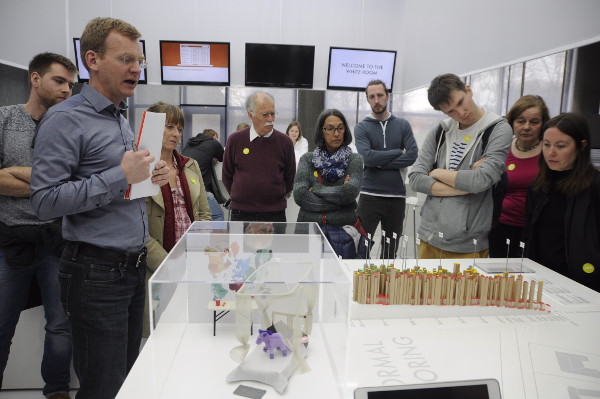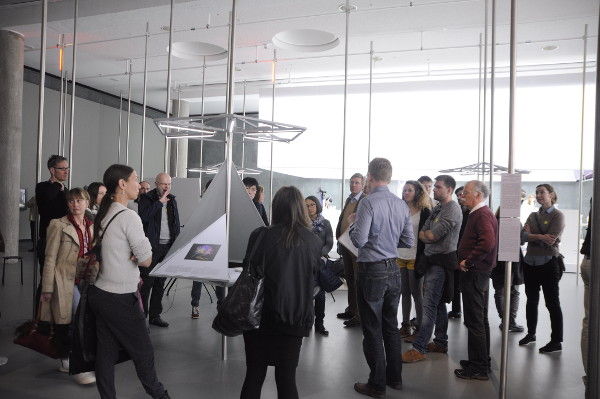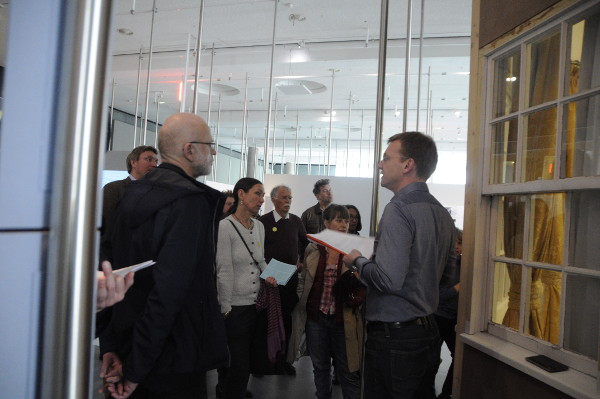 (Matthias Spielkamp giving a tour. Photo: Andrea Figari / Tactical Tech)
(Matthias Spielkamp giving a tour. Photo: Andrea Figari / Tactical Tech)
Interview with Matthias Spielkamp
Spielkamp gave a guest tour of the exhibition on Sunday, 3 April.
As part of the Nervous Systems exhibition programme, Matthias Spielkamp gave a guided tour of the exhibition in early April. We had a quick chat with him after his tour.
Could you tell us a bit about yourself? I am the co-founder and publisher of an online information magazine, iRights.info, which focuses on digital rights, data protection, data security and intellectual property rights. I am also the chief editor of mobilsicher.de, an online publication on security for mobile phones and tablets. Additionally, I am on the Board of the German section of Reporters without Borders.
What surprised you in the exhibition? First, I was positively surprised that it spurred so many ideas and so much creativity. I felt very honoured when Stephanie [Hankey, one of the co-curators] asked me if I wanted to do a tour, and accepted immediately. But then I wondered whether I could come up with enough interesting aspects to talk about. It was a rather baseless fear, as it turned out. When I started looking at the exhibition, I came up with tons of ideas which are close to my work and my heart. It was hard work to prepare everything, but I could do it. That was surprising.
Also surprising was how large the exhibition is -even if it is a relatively small room. It is not like going to a large museum, it is only one room. Still, I had trouble looking at it in one go. I came back three times to see all the exhibits and prepare my talk for the tour.

What objects or installations would you recommend from the exhibition? And why? First, it would have to be Assange' s room, because it is a very tangible exhibit. The rest of the exhibition is very rational, distanced. The access that you have to the exhibition is very rational. You have to rationally understand what the exhibits are about. You see a video or objects, and you need to read the text to understand the relationships. You cannot understand intuitively what the object is about and have some knowledge to put the object into context. But here, in Assange' s room we are seeing something that has colours, texture, space. We get the claustrophobic feeling, as we are - if only temporarily - restrained in that room. Even in most prisons, people have access to fresh air, they go outside, to a yard. He doesn’t have that. He is not going out. He stays there, for years and years. That feeling is what you experience in the room.
 Outside "Delivery for Mr. Assange – Assange’s room," by !Mediengruppe bitnik, 2014)
Outside "Delivery for Mr. Assange – Assange’s room," by !Mediengruppe bitnik, 2014)
Another thing is the "Dinner Scene" [Alex Verhaest, 2014]. That leaves a deep impression, it leaves a spooky feeling. It is fantastic that people can “call the picture” and then the work of art starts acting. But also the visuals are totally captivating. I had to look at it...but at the same time I was driven away. It is like looking at a traffic accident - you dont want to look at it, but you can't keep your eyes away from it.
And the final two are parts of the triangulation on data and truth ["Data Truth", Lawrence Liang]. Starting with the story of the inventor of systolic pressure measurement, which is an important part of the early polygraphs. He also created the comic “Wonder Woman” and tried to popularise the concept of the polygraph by giving Wonder Woman a “truth lasso”. He understood that he had to get the idea of the polygraph out there as part of popular culture to gain acceptance later by law enforcement and courts. And he succeeded. But this is only part of it, it is bizarre and strange.
Another thing made me cringe, the video piece showing someone being questioned by police under the influence of a “truth serum”, which was broadcast on live national television in India. Many people in Germany would agree with me that this runs contrary to all ideas of human dignity we might have. There are differences in perceptions of what dignity is in different cultures, but this was really shocking. The combination of these two elements was powerful in that triangulation.
Matthias Spielkamp: http://spielkamp.org/
iRights.info online magazine: iRights.info